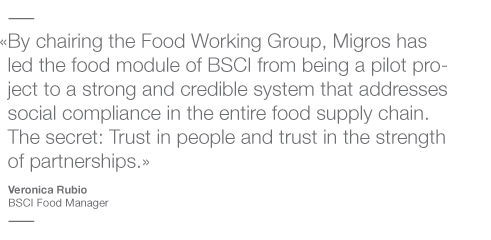For Products without a dark Past
Migros again worked towards establishing and enhancing globally recognised standards in 2011. It ensures that producers observe minimum quality, social and ecological standards.
Migros offers some 40 000 different items, many of which are from neighbouring and more remote countries. Binding production standards ensure that all products were made under correct conditions. For instance, the retailer wants to be certain that its goods were made under humane conditions, for instance without child or forced labour. These standards are not visible on the product, but instead can be seen on the labels.
BSCI Code of Conduct for suppliers
Via the BSCI Code of Conduct, Migros requires all its suppliers to observe minimum social standards. Independent companies regularly conduct regular audits. Suppliers that fail such tests are not immediately excluded, but can rectify the failings within a certain period of time. Migros supports suppliers in the implementation of correction measures. One year later, the companies affected are subject to a follow-up audit. 213 Migros suppliers were subjected to an audit in 2011. As of 2007, a total of 514 suppliers have been in the BSCI process. At the end of 2011, 48% of the suppliers predominantly failed to meet these requirements, 24% still need to rectify minor faults and about one third (28%) achieved the status of good. These figures are within the sector average. The most frequent reason for the non-fulfilment is the exceeding or working hours and the lack of a management system. The BSCI (Business Social Compliance Initiative) has grown to become the world's biggest social standard in recent years. For the organisation to keep up with the growing tasks, it was restructured under the umbrella of the Foreign Trade Association (FTA) last year. Migros supported this reorganisation from the very beginning. The BSCI is now able to conclude binding agreements more easily.
Chart on results of the BSCI audit

GlobalGAP in agriculture
Migros has demanded the GlobalGAP standard (GAP: Good Agricultural PracticeAgrarpraxis) from its foreign fruit, vegetable and potato suppliers for many years. GlobalGAP ensures that producers observe the same requirements around the world as regards good agricultural practice, food safety and environmental protection. Local farmers and suppliers must fulfil a variant of the GlobalGAP which is adjusted to Switzerland – the SwissGAP standard. In 2011, 98% of fruit and vegetable suppliers were GlobalGAP- or SwissGAP-certified. In addition to the GlobalGAP, Migros has recently developed a standard for social employment conditions with other domestic and foreign retailers as well as agricultural production organisations: GlobalGAP-GRASP (GlobalGAP Risk Assessment on Social Practices). The new standard obligates agricultural businesses to observe appropriate working conditions. To drive the implementation of the standard, Migros initially participated in pilot projects in southern Spain and hasalso done so in southern Italy since spring 2011. In 2011 independent inspection bodies examined 11 farms in Italy and 213 in southern Spain for their compliance with the GRASP requirements.
Eco standard for textiles
The textile industry is strongly decentralised around the world. It is also characterised by a particularly large amount of production steps from the raw material to the finished textile, and by the use of chemical substances. In this confusing sector, Migros ensures better working and environmental conditions with its specially developed eco standard. It bans and monitors the use of hazardous and polluting substances at all production levels. Some 65% of all clothes and home textiles offered by Migros correspond to the eco guidelines. Not only chemicals, but also production techniques, such as sandblasting jeans, can be hazardous to employees' health. For this reason, Migros decided to do without this technique for its jeans in 2010. In mid-2011 it removed the last jeans products from its shelves. An enquiry with the business partners in the meantime showed that no cases of sick employees are known. Migros also worked towards addressing this problem across the sector at the BSCI.
Reference system GSCP for social and environmental standards
In addition to the above, there is an unmanageable range of standards around the world. To harmonise the numerous individual initiatives and standards, Migros joined forces with the world's four biggest retailers to form the Global Social Compliance Programme (GSCP) in 2006. Today, more than 30 companies around the world are members of GSCP. The GSCP has defined a reference system, with which the standards can be compared. This greatly increases transparency in the procurement market, the focus is switched from inspections to empowering companies, and manufacturers can cooperate far more efficiently with retailers. Migros added initial standards to the reference system in 2011.